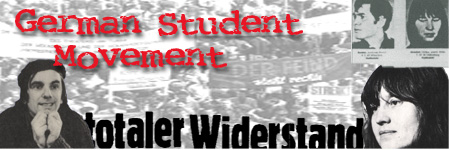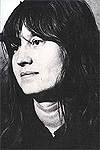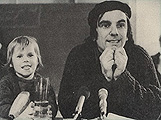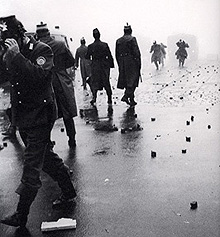

 "Die
Grenze zwischen verbalem Protest und physischem Widerstand ist bei den Protesten
gegen den Anschlag auf Rudi Dutschke in den Osterfeiertagen erstmalig massenhaft,
von vielen, nicht nur einzelnen, über Tage hin, nicht nur einmalig, vielerorts,
nicht nur in Berlin, tatsächlich, nicht nur symbolisch - überschritten
worden."
"Die
Grenze zwischen verbalem Protest und physischem Widerstand ist bei den Protesten
gegen den Anschlag auf Rudi Dutschke in den Osterfeiertagen erstmalig massenhaft,
von vielen, nicht nur einzelnen, über Tage hin, nicht nur einmalig, vielerorts,
nicht nur in Berlin, tatsächlich, nicht nur symbolisch - überschritten
worden."
-Ulrike Meinhof, "Vom Protest zum Widerstand," May 1968
These words were penned by Ulrike Meinhof in 1968 and poignantly illustrate the turbulent atmosphere of student unrest prevalent in the late 1960's in the Federal Republic of Germany. United by their disdain for the fascistic and imperialistic facets of capitalism, symbolized by the United States and NATO's advance of Cold War politics in southeast Asia, these students staged teach-ins, sit-ins and non-violent demonstrations as pressure tactics to gain political leverage. Organized by the SDS (Sozialistische Deutsche Studentenbund), the SPD's mouthpiece at the university level, these peaceful demonstrations quickly escalated to more aggressive counter attacks in response to the shooting death of student Benno Ohnesorg by police in June 1967, and the murder attempt on Rudi Dutschke in April 1968.
 Just
one month before an assassination attempt on his life, Rudi Dutschke, a highly
visible student leader, asserted in an interview that "the extent of our
counter-violence is determined by the amount of repressive violence employed
by the ruling powers" (SDS 6). The violent attack on Dutschke, which came
from the radical right, engendered some of the most ardently militant demonstrations,
including the attempt to shut down distribution of newspapers owned by conservative
media magnate Axel Springer and the explosion of four fire bombs in two Frankfurt
department stores - the first terrorist action of the RAF. The fervor with which
the German authorities sought to halt leftist political activity in the late
60's to mid-1970's culminated in 1976 with the so-called Berufsverbot
policy, which allowed for background checks into the political activities of
prospective applicants for civil servant positions, including educators.
Just
one month before an assassination attempt on his life, Rudi Dutschke, a highly
visible student leader, asserted in an interview that "the extent of our
counter-violence is determined by the amount of repressive violence employed
by the ruling powers" (SDS 6). The violent attack on Dutschke, which came
from the radical right, engendered some of the most ardently militant demonstrations,
including the attempt to shut down distribution of newspapers owned by conservative
media magnate Axel Springer and the explosion of four fire bombs in two Frankfurt
department stores - the first terrorist action of the RAF. The fervor with which
the German authorities sought to halt leftist political activity in the late
60's to mid-1970's culminated in 1976 with the so-called Berufsverbot
policy, which allowed for background checks into the political activities of
prospective applicants for civil servant positions, including educators.
